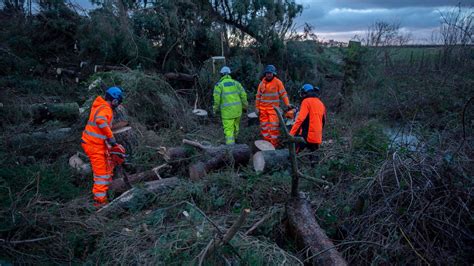The government is ordering power grid operators to strengthen compensation schemes, up their communications, and improve re-connection times after one million customers were left ‘unacceptably’ cut off by November’s storms.
North-west and north-east England and Scotland bore the brunt of Storm Arwen’s havoc, with 75,000 customers losing power for 48 hours or more. Nearly 4,000 were left without electricity for a week, around 16 million trees were flattened, and three people died.
Now energy secretary Kwasi Kwarteng is setting deadlines for energy bosses to improve.
DNOs most heavily implicated, including Northern Powergrid, SSEN and Scottish Power, have between them already paid £34 million in direct compensation, plus £10 million in redress payments, D-BEIS confirmed this morning.
Getting information quicker to affected customers, speeding up compensation pay outs, and making engineers look at network resilience specifically in terms of customers inconvenienced, are the three routes to improvement, set out in a joint review by Ofgem and D-BEIS announced this morning.
Ofgem also reported today on how DNOs complied with their legal obligations to restore service.
On grid integrity, the joint review promises a new ‘outcomes-focused physical resilience standard’, which will define standards in terms of consumers’ plight, as opposed to current norms, defined solely in terms of the engineering measures needed implementation.
On compensation, almost nine in ten claimants received payouts by 24 January, after Kwarteng urged suppliers to speed up payments. But a two-month delay is not good enough, the review finds, recommending that DNOs must develop more robust protocols.
Energy secretary Kwarteng commented: “Storm Arwen was one of the most extreme weather events in decades, and I’m grateful to all those engineers, armed forces personnel and volunteers who worked to get people reconnected to power.
“However, it’s clear that thousands of customers were badly let down by electricity network companies, which is why I launched this review to identify and address any failings.
Ofgem to decide
“This action plan will ensure better preparedness for future storms, boosting the security of our electricity system and protecting families.”
On communications, remedies proposed today include hiring more call centre staff, possibly sharing them across relief organisations such as local councils, and stronger, more informative websites.
Responding for the DNOs, Electricity Networks Association chief executive David Smith pointed to an intended 20% increase in spending on fail-safe measures and network resilience, under the RIIO-ED2 price control regimes.
Six DNOs want to spending £ 14.5 billion in the next five years, up on £12 billion in the last round. Ofgem’s decision on RIIO-ED2 is due in coming weeks.
“It’s important customers have trust in their network operators and are supported during severe weather events”, said Smith.
“As well as implementing the recommendations set out by government and the regulator and enhancing customer service, network operators have also identified areas which will need increased investment to provide better energy security and service for customers in the long term.
“This is particularly important as severe weather events become more frequent”.
Read the final report of the energy emergencies committee’s Storm Arwen review here.




